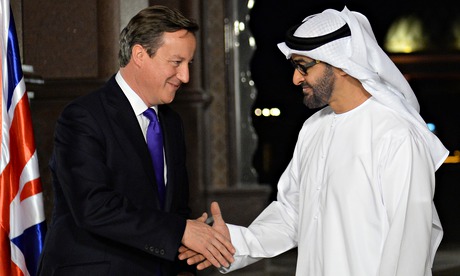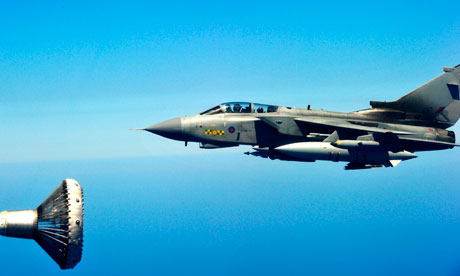The Emiratis' secret bombing in Libya shows the strength of their desire to combat jihadists: Saudi Arabia is more reticent.

The UK's prime minister David Cameron met the UAE's Crown Prince Mohamed bin Zayed in November last year. Photograph: Stefan Rousseau/PA
On the face of it, this is one of those baffling moments that seem to occur with increasing frequency in the Middle East these days: why has the United Arab Emirates, a small, wealthy Gulf state, been secretly bombing targets in distant Libya from bases in Egypt – and without telling the US, its closest ally? Looked at a little more closely, however, the news reflects wider changes in the region, and a sense that Washington is retreating from it.
Shaken by the turbulence of the Arab spring, the UAE has emerged as the most assertive of the conservative Gulf monarchies. It does not share the traditional reticence of Saudi Arabia, especially when it comes to combatting what both now see as the most dangerous challenge to the status quo – the rise of Islamists at home and abroad. Countries once obsessed by the threat from Iran are now more fearful of the Muslim Brotherhood and likeminded groups.
The first signs of the UAE's new role emerged in 2011, when Crown Prince Mohammed bin Zayed – the de facto ruler – joined Nato air operations in Libya and backed rebels fighting to overthrow Muammar Gaddafi. The UAE chose its allies on a regional and tribal basis, singling out militias in Zintan in the west. Qatar, its Gulf neighbour and rival, funnelled its support to Islamist brigades, especially in Misrata.
It has been rumoured for weeks that the Emiratis have been discreetly backing General Khalifa Haftar, the renegade Libyan general who presents himself as the only man who can save his chaotic country from the depredations of Islamists he dismisses as terrorists. Haftar, like the UAE and Egypt, makes no distinction between the Muslim Brotherhood, who have taken part in elections, and dyed-in-the-wool jihadis such as Ansar al-Sharia.
 In 2011 the UAE joined Nato air operations in Libya and backed rebels fighting to overthrow Muammar Gaddafi. Photograph: Alberto Pizzoli/AFP/Getty
In 2011 the UAE joined Nato air operations in Libya and backed rebels fighting to overthrow Muammar Gaddafi. Photograph: Alberto Pizzoli/AFP/Getty
Like Saudi Arabia, the UAE was dismayed by the overthrow and US abandonment of Egypt's Hosni Mubarak. Now it is the leading supporter of Abdel-Fatah al-Sisi, who ousted Egypt's democratically elected but unpopular Mohamed Morsi last summer – a grievous blow to Morsi's Muslim Brotherhood that delighted all the Gulf states except Qatar. The Emiratis have since bankrolled Egypt and advised it on economic reform – with the help of Tony Blair.
On the domestic front, the UAE has cracked down hard on dissent, accusing members of the Islamist Islah group of plotting to seize power and last year jailing 69 of them after a controversial trial that was condemned by human rights organisations. General Dahi Khalfan, former head of the Dubai police force, has been especially outspoken about the threat of Brotherhood "subversion". Anwar Gargash, the UAE's deputy foreign minister, is another hard-nosed exponent of the need to confront Islamists of all hues.
The UAE backs individuals who challenge its enemies: Ahmed Shafiq, the candidate beaten by Morsi in 2012, is based in Abu Dhabi. Persistent rumours suggest Emirati sponsorship of Mohammed Dahlan, Yasser Arafat's former security chief and a sworn enemy of Hamas, the (Qatari-backed) Islamist movement that rules Gaza – Dahlan's home turf. Competition with Qatar remains an important motive, UAE-watchers say.
Emiratis also point to concerns about Libyan involvement with Isis in Iraq and Syria – which these days are together an even bigger worry than the Brotherhood.
Emirati assertiveness has been felt, too, in relations with its western allies, including Britain, a leading trading partner. Last year the UAE became the first Arab country to send an ambassador to Nato – not surprising for a country that spends most of its defence budget on weapons bought from the US, UK and France. UAE pressure was one of the reasons why David Cameron ordered a controversial review of the Muslim Brotherhood last spring. The work was recently completed, but has not yet been published, probably because it will be difficult to make policy recommendations. Abu Dhabi has hinted at repercussions for bilateral relations if the review's findings are not to its liking.
The Libya raids look likely to trigger new strains between the west and its anxious Arab allies. Abu Dhabi's silence and Cairo's "plausible denial" of direct involvement convince no one. In any case, the air attacks have not been effective: Tripoli airport and the capital as a whole are now under the control of Islamist fighters. The US, UK and France went to war to overthrow Gaddafi in 2011. But now that the hopes of the Arab spring are a distant memory, they insist that military support for Libya's warring factions will not help restore desperately needed stability and that only dialogue can succeed. The Emiratis and Egyptians clearly disagree.


No comments:
Post a Comment